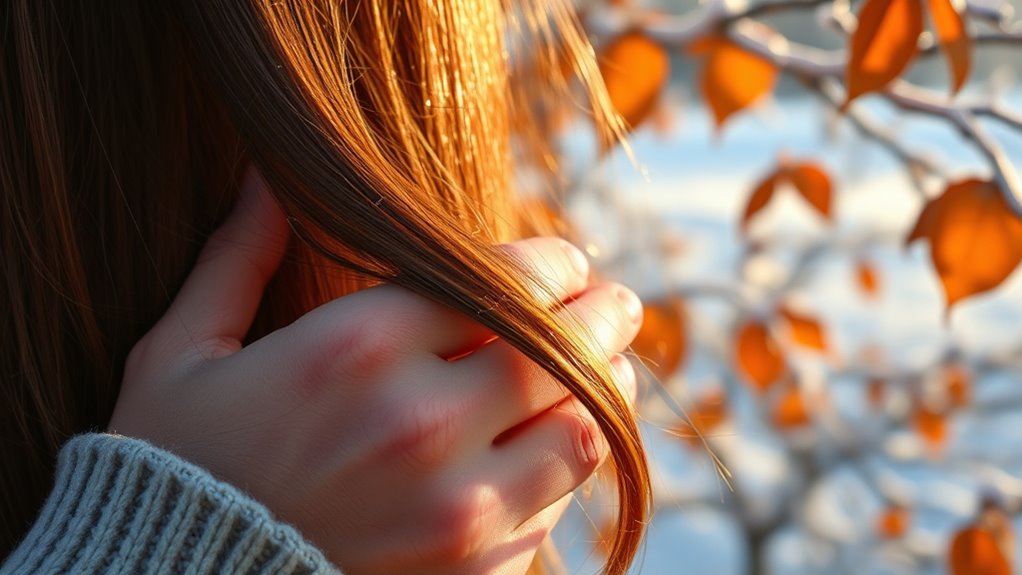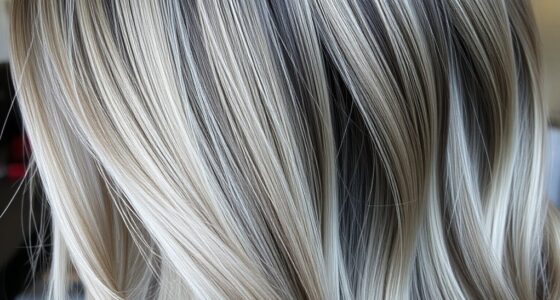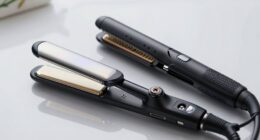As seasons turn to fall and winter, your hair faces new challenges like dryness, frizz, and scalp issues. Cold air and indoor heating strip moisture, so you should switch to hydrating shampoos, use rich conditioners, and incorporate weekly deep treatments. Protect your hair from damage with heat protectants and gentle styling. Wearing hats or scarves carefully can help, but there’s more to maintaining healthy hair in these cozy months—keep exploring to discover expert tips.
Key Takeaways
- Adjust hydration routines to combat dryness caused by cold air and indoor heating.
- Use hydrating shampoos, rich conditioners, and weekly deep conditioning treatments.
- Minimize heat styling and always apply heat protectant when using hot tools.
- Seal moisture with oils like argan or coconut and protect hair with gentle accessories.
- Maintain scalp health with oils or treatments to prevent dryness and flakiness.

As the seasons change, your hair faces new challenges that require different care strategies. During fall and winter, the air becomes drier, but you might also encounter humid weather in some regions, which can make your hair behave unpredictably. Humid conditions cause your hair to frizz, lose definition, and become harder to manage. To combat this, you’ll want to switch to hydrating shampoos and rich conditioners that lock in moisture. Look for products with humectants like glycerin or aloe vera, which draw moisture into your hair shaft. Incorporate deep conditioning treatments weekly to rebuild the moisture barrier and prevent breakage. When it’s humid outside, avoid heavy styling products that can weigh your hair down or make it look greasy. Instead, opt for lightweight serums or anti-frizz sprays that smooth your strands without adding extra weight. If you’re planning holiday styling, such as glamorous updos or intricate braids, prep your hair with a heat protectant and finish with a light mist of anti-frizz spray to ensure your look stays polished despite the humidity.
As the temperature drops, your hair also reacts to cold air and indoor heating, which can strip away natural oils and cause dryness. To adapt, you should increase your hydration routine and use oils like argan or coconut to seal in moisture. Wearing hats or scarves can protect your hair from harsh wind and cold, but make sure they’re not too tight, as this can cause breakage. When you style your hair for holiday events, keep heat styling to a minimum—air-drying or using cool settings on your blow dryer helps minimize damage. If you do use heat tools, always apply a heat protectant first. During the colder months, your scalp may become dry or flaky, so consider using a scalp oil or treatment to maintain scalp health and promote strong hair growth.
Frequently Asked Questions
How Does Humidity Affect Winter Hair Dryness?
In a humid climate, winter dryness can worsen if your hair has high porosity because moisture escapes easily. Humidity helps keep your hair hydrated, but when it’s low, your hair loses moisture faster, leading to dryness and frizz. To combat this, use deep conditioners and sealants like oils to lock in hydration. Adjust your routine based on your hair porosity and the humidity levels to protect your hair effectively.
Can Cold Weather Cause Hair Color Fading?
Cold weather can subtly influence your hair color, making it fade faster over time. To keep your hue vibrant, you need to prioritize hair dye maintenance and follow color protection tips. Be sure to wear a hat or scarf outdoors, limit exposure to harsh elements, and use color-safe shampoos. These simple steps help shield your color from winter’s chill, ensuring your hair stays lively and beautiful despite the cold.
What Are Best Oils for Winter Scalp Health?
You should use essential oils like tea tree, lavender, or peppermint to boost scalp hydration and promote healthy winter scalp. These oils help reduce dryness, itchiness, and flakiness caused by cold air. Mix a few drops with a carrier oil such as coconut or jojoba, and gently massage into your scalp. Regular use keeps your scalp moisturized, nourished, and resilient during the chilly months.
How Do I Prevent Hair Breakage From Hats?
To prevent hair breakage from hats, choose hats made of soft, breathable materials like cotton or wool, which reduce hair tension. Avoid tight-fitting hats that pull on your hair, causing stress and breakage. When wearing a hat for extended periods, loosen it slightly and wear a satin or silk scarf underneath to minimize friction. Regularly moisturize your hair to keep it healthy and resilient against potential damage.
Are Certain Shampoos Better for Winter Hair?
Yes, certain shampoos are better for winter hair protection. Look for shampoos with hydrating ingredients like glycerin, aloe vera, and oils to combat dryness caused by cold air. Avoid harsh sulfates that strip moisture. Using a gentle, moisturizing shampoo helps maintain your hair’s health, reduces breakage, and keeps your hair smooth and manageable during winter. Make sure to follow up with conditioners and treatments to lock in hydration.
Conclusion
As the seasons change, adapting your hair care routine is essential. Remember, winter air can strip moisture, leading to dry, brittle hair. Did you know that over 60% of people experience increased hair breakage during colder months? By moisturizing regularly and protecting your hair from harsh elements, you can keep your locks healthy and vibrant year-round. Stay proactive, and your hair will thank you for it through every seasonal shift.









